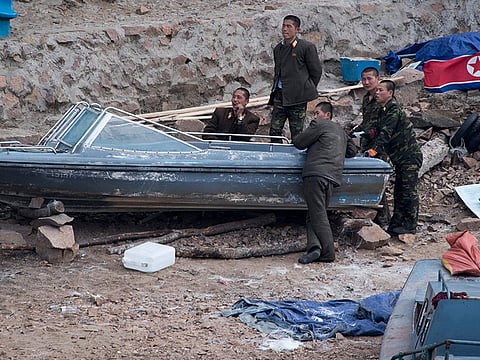Pyongyang from the inside
While the whole world speculates North Korea’s future, few people have the insight about what’s really going on in the country

Looking over the skyline of Pyongyang from the Yanggakdo hotel, North Korea’s largest hotel and second-tallest building where most foreign visitors are requested to stay, the view is actually quite impressive.
Tall white buildings, with the strange silhouette of the massive, pyramid-shaped Ryugyong Hotel towering in the distance, broad avenues and the majestic stream of the Taedong River seem to draw an idyllic postcard picture of an Asian metropolis.
But this appearance is deceptive. Pyongyang doesn’t really feel like a city. It rather feels like a stage, impersonal, cold and quite deserted when compared to any other East Asian metropolis.
Most landmarks are propaganda structures, the tall residential buildings at a closer look seem to be in a state of disrepair as quite a few of them don’t even have glass in the window frame.
The Ryugyong Hotel, despite renovation works by Egyptian company Orascom conducted over the past years, remains unopened and basically an empty shell despite its shiny exterior glass panels that now cover a 30-year-old empty concrete skeleton.
And despite the huge coal-fired power plant in the west of the city that exhumes billows of black fumes, Pyongyang and its residents suffer from constant power outages that add to the scarcity of many basic goods, be it most foodstuffs, soap, clothing, medicines or even candles for lighting.
That said, residents of Pyongyang are still better off than people living elsewhere in the country who are in an even more severe struggle to get along. Pyongyang urbanites consider themselves an elite bracket of society since being allocated a flat in the capital is not possible without connections to party cadres and other fixers.
And if someone, for some reason, has access to hard currency such as the yuan renminbi or, even better, the US dollar or euro, there are even markets and department stores where useful goods can be bought, for example winter coats, electronic gadgets, toys, cosmetics, household articles and even Chinese-made bicycles.
When we last visited the relatively upmarket Paradise Department Store in Pyongyang, we noted that people openly pay in foreign currency and that there is a two-tier system of prices for imported and domestically manufactured products at a somehow adapted exchange rate.
For example, a Chinese-made washing machine would cost around eight million won, which would be a whopping $8,900 when the official exchange rate of 1:900 is taken. It was, however, priced at $950 which hints at a black market rate of about 1:8,400.
Since recent times, many Pyongyang residents also frequent the Central Market along the shore of the Taedong River which saw some development towards small-scale tolerated business activities of vendors selling meat, rice, fruits and vegetables, clothes and household goods at the black market rate.
That market is among the places where everyday life in Pyongyang can be studied best. Shoppers strolling along the vending booths, people sitting down for a chat, drinking tea, and what seems to be businessmen getting a haircut in a small salon.
Noticeable is the absence of smartphones and related gadgets that are so prevalent in other Asian cities. In fact, despite the existence of a domestic 3G cell phone network called Koryolink, at least in Pyongyang and some other larger cities, there is not much to do with it since North Korea only allows internet access to domestic, state-controlled servers and has no outside connections at all, at least for the public. So, it is a very rare sight that someone would be texting or playing games on a smartphone. People keep interacting with each other directly and have old-fashioned personal conversations.
What they are actually talking about is hard to determine. Probably they are complaining about power outages, lack of maintenance in their buildings, empty groceries or broken heaters and elevators.
They probably don’t discuss world politics because there is nothing to discuss the party hasn’t already predefined in state-run newspapers that are distributed in public places and subway stations and, from time to time, announced through loudspeakers which transforms Pyongyang into quite an Orwellian place at times.



